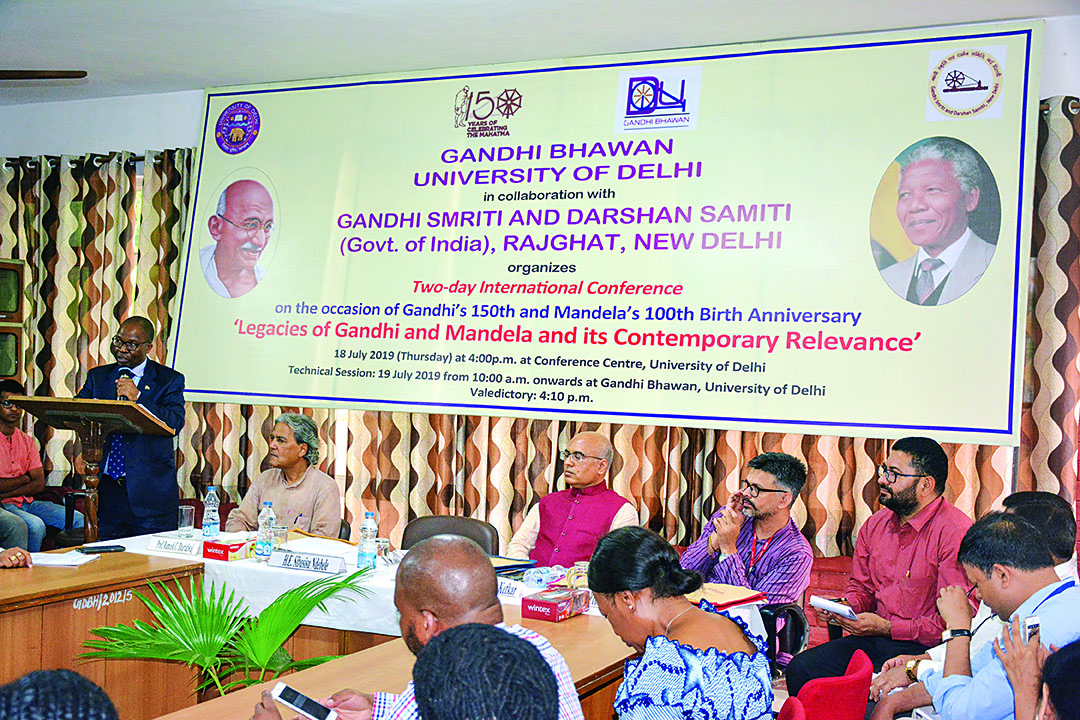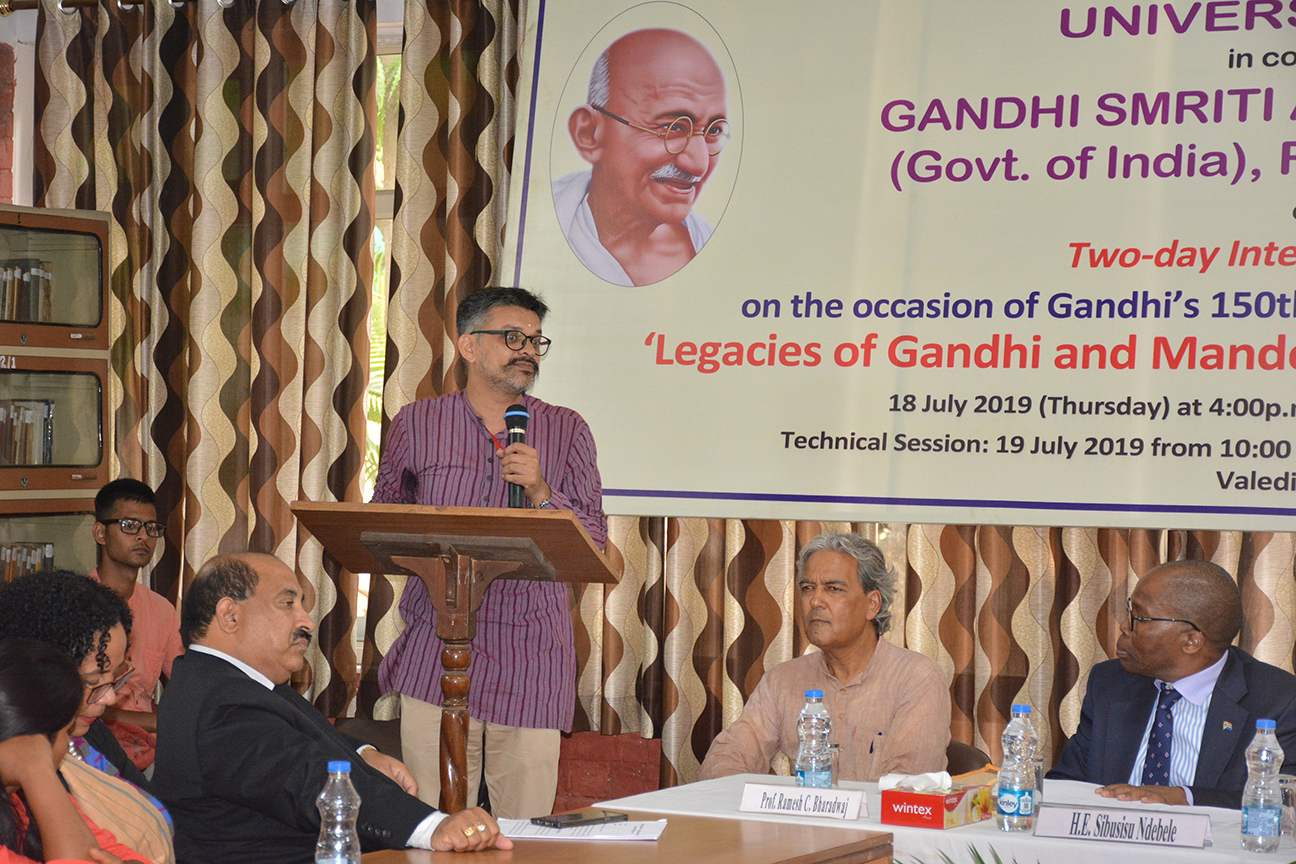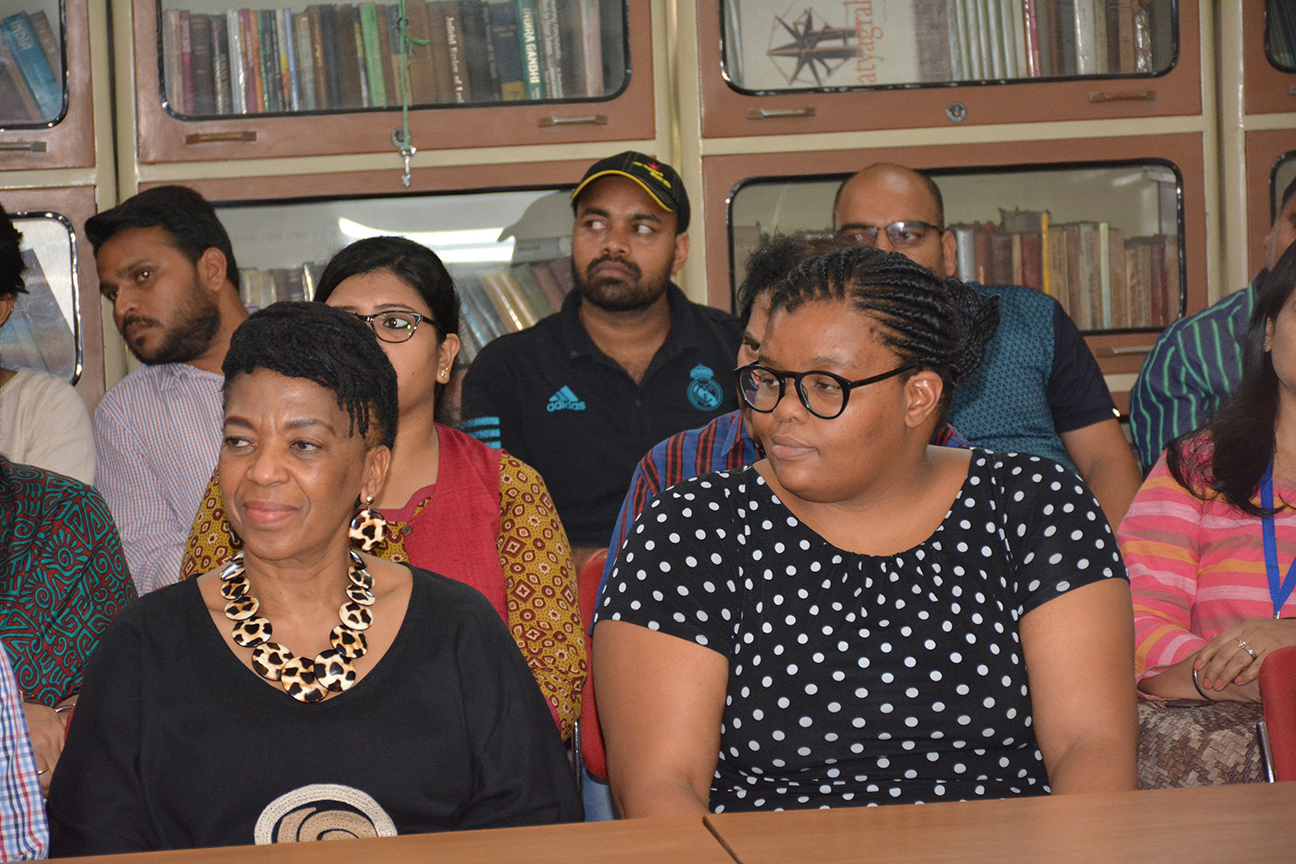
Shri Sibusisu Ndebele speaking at the conference. Others on dais from left are Prof Ramesh C Bhardwaj, Shri Akhilesh Mishra and Shri Prafulla Ketkar
Two-day international conference at Gandhi Bhavan of University of Delhi discusses the legacies of Gandhi and Mandela and their contemporary relevance
“Both Bharat and South Africa have achieved Independence. But we both the nations are still struggling for the freedom from inequality, poverty and unemployment. We can get freedom from these problems by following the path of Mahatma Gandhi and Nelson Mandela,” said High Commissioner of South Africa in India Shri Sibusisu Ndebele while speaking at the valedictory session of a two-day international conference held at Gandhi Bhavan on July 19. Organiser editor Shri Prafulla Ketkar, Director General of Indian Council of Cultural Relations (ICCR) Shri Akhilesh Mishra and Director of Gandhi Bhavan Prof Ramesh C. Bhardwaj were also present.
The conference was organised by Gandhi Bhavan of Delhi University in association with the Gandhi Smriti and Darshan Samiti to mark the 150th birth anniversary of Mahatma Gandhi and birth centenary of Nelson Mandela. The topic of discussion at the conference was “Legacies of Gandhi and Mandela and its Contemporary Relevance”.
Shri Sibusisu Ndebele called upon the people of both the countries to contribute to addressing the problems of their respective countries. “Freedom is only a step to get power. The major task is to use that power for the betterment of the people,” he said while discussing the unequal land distribution in South Africa and how the white people still control major part of the land there.

Shri Prafulla Ketkar said there is a certain philosophy that guides both Gandhi and Mandela and unless we understand that basic philosophical question we cannot understand both the personalities in real sense. “None of Gandhi and Mandela was born great. Theirs was the journey from ordinary to extraordinary and from relative truth to absolute truth. But the problem with most of the people is that we believe that Gandhi should be somebody else and we are only ordinary persons,” he said. He said the decentralisation thought of Gandhi is relevant for both India and South Africa and the idea of Satyagrah was not only for freedom but for the reconstruction of the nation ensuring Swaraj and Suraj for each and every countrymen. Shri Ketkar also stressed upon decolonising the mind to reinvent Gandhi and Mandela.
Shri Akhilesh Mishra said the contribution of both Gandhi and Mandela has been recognised with high respect by the entire world. Gandhi and Mandela stressed on “be the change that we wish to see in the world”. This mantra is still relevant and guides the people to join the constructive activities around us. He said we must follow the vision of both the great leaders in practice.
Earlier on July 18, inaugurating the conference Vice-Chancellor of the University of Delhi Prof Yogesh Kumar Tyagi deliberated his speech by combining the Gandhian thought of “Forget, Forgive and Forward” with Nelson Mandela’s “Truth and Reconciliation and work for the development of the Society.” He also explained Gandhian Truth and Ahimsa and Mandela’s Hope and Determination. The inauguration of the conference began with the inauguration of a photo-exhibition on Gandhi and Mandela by Prof Tyagi.

Ambassador of the State of Eritrea in India Shri Alem Tsehye was the Chief Guest at the inaugural session. Director of Campus of Open Learning, University of Delhi, Prof CS Dubey was also present. Biography of Dr Nelson Mandela written in Hindi by Prof Mohini Mathur was also released at the function. Prof Mathur shared her views with the audience regarding the biography. Knowledge partner of Department of African Studies Prof Suresh Kumar was also present.
The technical session of the conference began at 10.00 am on July 19. Prominent among those who chaired various sessions included Shri Ram Chander Rahi—president of Gandhi Smarak Nidhi, Rajghat, Shri Anandroy Ramdev—Attorney-Conveyancer, Braamfontein, Johannesburg, South Africa, Prof MN Thakur from JNU, Prof Patricia Teixeira Santosh from Department of History in University of Sau Paulo, Brazil and Shri Kumar Prashant—chairman of Gandhi Peace Foundation.














Comments